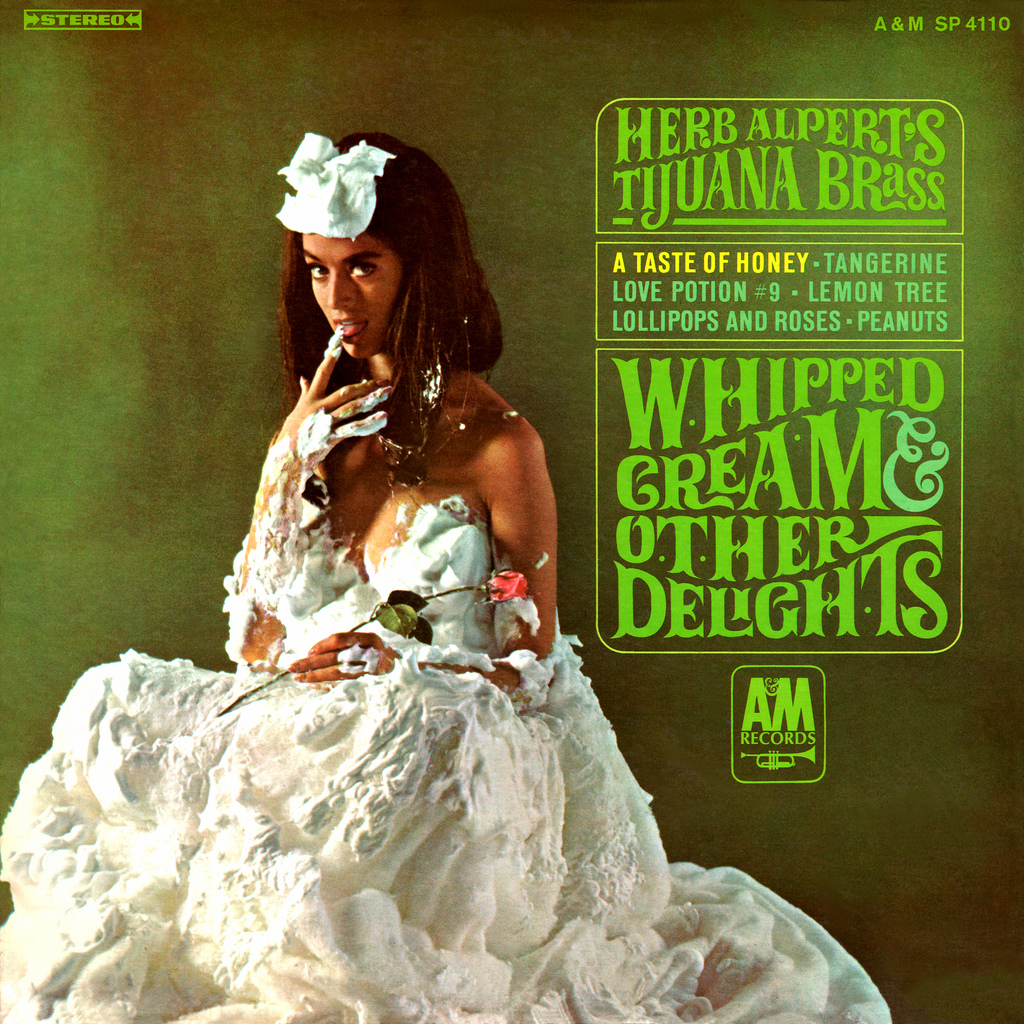 If we examine the highest-charting albums of 1965 as tracked by Billboard magazine, we find the #1 slot dominated by movie soundtracks (Roustabout, Mary Poppins, Goldfinger, The Sound of Music and Help!), two LPs constructed by the Beatles’ American label Capitol that weren’t issued in England (Beatles ’65 and Beatles VI) and the Rolling Stones’ Out of Our Heads.
If we examine the highest-charting albums of 1965 as tracked by Billboard magazine, we find the #1 slot dominated by movie soundtracks (Roustabout, Mary Poppins, Goldfinger, The Sound of Music and Help!), two LPs constructed by the Beatles’ American label Capitol that weren’t issued in England (Beatles ’65 and Beatles VI) and the Rolling Stones’ Out of Our Heads.
But the album that ruled the selling season from Thanksgiving to Christmas, and beyond, was one that appealed to hippies, squares, little old ladies, teenagers, Playboy-reading guys who dug the modern jazz scene—just about anyone with a set of ears who had access to a radio, stereo or television set. The album that spent nearly three years in the Top 40 was Whipped Cream & Other Delights, the fourth set from Herb Alpert’s Tijuana Brass.
Alpert and his business partner Jerry Moss had founded their independent record label A&M in 1962, and almost immediately found success by recording top-tier Los Angeles musicians at Gold Star Studios, pretending to be a somewhat tongue-in-cheek fake Mexican mariachi-style band. As Alpert told English journalist Peter Jones in 1966 as he began a first U.K. tour, “I’m not Mexican, we don’t use all brass in the group and there are only seven of us. That’s me on trumpet, one more trumpeter, a couple of guitars, piano, drums and trombone. And let me not hear anyone saying we must do a lot of double-tracking because it just isn’t true. What’s more, we haven’t stuck to the same lineup in the nearly four years we’ve been going.” Alpert had only recently decided to organize a group that could tour.
Herb Alpert, who began playing trumpet as a child, was raised in the Boyle Heights section of Los Angeles by Jewish immigrant parents from Ukraine and Romania, and was hooked on Dizzy Gillespie, Miles Davis and other jazz greats. He developed the idea for the Tijuana Brass while taking in a bullfight across the border with Moss, then rehearsing in his garage to find “a definable sort of swing” that merged mariachi with Caribbean and South American Latin jazz.
Alpert saw a lot to admire in pop music, and wasn’t a snob about the culture of family entertainment and filled nightclub dance floors. He also realized playing instrumental music, without lyrics to convey a story or message, demanded a special approach. As he told writer Josh Kun many years later, “I realized how important it is to be visual with instrumental music, so that each song, each arrangement, each presentation has a real visual image. It takes the place of that powerful lyric that an instrumental doesn’t have.”
Whipped Cream & Other Delights, produced by Alpert and Moss in late 1964 and engineered by Phil Spector’s go-to guy Larry Levine, was recorded with the (uncredited) cream of L.A. players, including drummers Hal Blaine and Frank DeVito, guitarist John Pisano, percussionist Julius Wechter, Carol Kaye and Chuck Berghofer on bass, and Russell Bridges (also known as Leon Russell) on keyboards, along with Don Randi.
The title tune “Whipped Cream” did merely OK as a single release in February ’65: the album, released that April, didn’t really explode until “A Taste of Honey,” a track relegated to the B-side of a previous single of “The Third Man Theme,” was re-promoted as an A-side and placed as the opening track on the LP, released in April. Written by Bobby Scott and Rick Marlow, “A Taste of Honey” had been used as a recurring theme for a British play of that name, and the 1961 film adaptation. The Beatles liked it well enough to record a version with lyrics (heavily influenced by Lenny Welch’s U.S. adaptation) for their debut Please Please Me.
The Tijuana Brass version begins with a melancholy air typical of other versions of the song before Blaine’s bass drum signals a change to a peppy, highly infectious take. Alpert’s trumpet tone is full and warm, the guitarist’s use of light tremolo on the more downbeat sections is very cool, and Wechter adds the marimba that was a crucial part of the band’s signature style. (Eventually, Wechter’s own spin-off group the Baja Marimba Band had its own success on A&M.) True to Alpert’s desire, “A Taste of Honey” absolutely swings, while still giving room to mariachi-inflected tempo breaks. The track won three Grammys, including Record of the Year.
Moss’ desire to have a “food theme” pervade the album means the highly melodic “Green Peppers,” “Bittersweet Samba” and “El Garbanzo,” composed by Alpert’s “trusted song pusher” Sol Lake, get titles that don’t especially relate to any musical material. “El Garbanzo” is the most Mexican-sounding, with a little “Mexican Hat Dance” homage in the arrangement, and “Bittersweet Samba,” taken a lot faster than a traditional Brazilian dance, features Wechter’s vibraphone, Pisano’s acoustic guitar, and the ever reliable Alpert.
“Tangerine,” with lyrics by Johnny Mercer to Victor Schertzinger’s melody, had been a jazz-pop standard since it appeared in the 1942 film The Fleet’s In. Benny Goodman and Frank Sinatra recorded the romantic slow-burner, and Alpert follows their lead. You can hear his superb breath control and absolute control of the trumpet tone. He sings along with the piano solo, presaging those times in the future where his vocals yielded big pop hits, like his version of Bacharach-David’s “This Guy’s In Love With You,” which hit #1 in 1968.
“Ladyfingers” is another slow, sultry tune, written by the Belgian virtuoso guitarist, harmonica player and whistler Toots Thielemans, whose long career encompassed the soundtracks of Midnight Cowboy, Sesame Street and a zillion more. The jazz fan Alpert no doubt knew his much-recorded song “Bluesette”; it appears the Tijuana Brass was the first to record “Ladyfingers,” a soaring melody buttressed by one of the few string arrangements on Whipped Cream. There’s a nice use of celeste, trombone, vibes and congas.
Will Holt wrote the folk song “Lemon Tree” in the ’50s, inspired by a Brazilian song from decades before. Peter, Paul and Mary’s version got them their first appearance on the U.S. Hot 100, but it was Trini Lopez’s 1965 single that was the bigger hit. The Tijuana Brass’ languid rendition features a spectacular Spanish guitar in the echoing style of Marty Robbins’ “El Paso,” and (probably) Tonni Kalash matching Alpert’s gorgeous trumpet line.
In the hands of Alpert, “Peanuts” (also known as “La Cacahuata”) is a polka that smooths out some of its Tex-Mex, San Antonio heritage. The original song by Luis Guerrero was taken at a breakneck pace on the Sunglows’ original 45 from mid-1964, but the Tijuana Brass take is more stately, not unlike the processional music heard at a bullfight.
“Butterball” manages to fit Dixieland jazz into the proceedings, with Blaine demonstrating his superior backbeat. “Lollipops and Roses” was a hit for Jack Jones in 1961, and while the Tijuana Brass take is well played and arranged, it’s probably the LP’s least impressive track.
Leiber and Stoller’s much-recorded “Love Potion No. 9” is shoehorned into the “food” theme so Alpert can demonstrate he can lead a “striptease” number every bit as convincingly as David Rose had with his #1 pop smash “The Stripper” in 1962. Perhaps it’s also a nod to Whipped Cream’s sexy album art, which became almost as famous as the music it enclosed.
Providing mostly-male LP buyers with attractive females to ogle on album covers was pretty standard procedure in the ’50s and ’60s, but the appearance of veteran actress and model Dolores Erickson (three months pregnant at the time of the photo shoot) became a phenomenon. She was bedecked in shaving cream for the actual photo, not whipped cream, but the suggestion that it might be licked off (indicated by the delicate way her tongue touches her finger) has driven many decades of admirers a little batty. The sexual fantasy concocted by A&M’s art director Peter Whorf, which Alpert originally balked at, has been parodied many times without damaging the dreamy, seductive quality of the original.
[A 60th anniversary vinyl picture disc edition of Whipped Cream… was released in 2025. The remastered edition on 180-gram vinyl is available here and in the U.K. here.]
The album cover’s notoriety probably encouraged the very popular TV show The Dating Game’s decision to use “Whipped Cream” as one of several Tijuana Brass recordings to introduce nubile male and female contestants on the show. The song’s composer Allen Toussaint (writing under his pseudonym Naomi Neville) no doubt appreciated the extra paychecks. Given that Whipped Cream & Other Delights sold millions of albums, and continues to do well on streaming services, everyone involved has reason to be proud of their musical accomplishments, and their cultural impact, to this day.
Herb Alpert and Jerry Moss got a huge payday when A&M was sold for more than $500 million in 1989; their philanthropy has benefitted many art and music institutions in Los Angeles. Moss died on Aug. 16, 2023. Cover model Dolores Erickson is still getting fan letters.
If you’re a new Best Classic Bands reader, we’d be grateful if you would Like our Facebook page and/or bookmark our Home page.
Watch Herb Alpert & the TJB on The Ed Sullivan Show, performing “A Taste of Honey”
Alpert continues to record and he’s touring in 2025 with the Tijuana Brass Band. Tickets are available here and here. His extensive recordings are available in the U.S. here and in the U.K. here.
Related: Our interview with Herb Alpert







6 Comments so far
Jump into a conversationI still have my much-played and adored “Whipped Cream” LP. Might have been the first LP I ever looked at long enough to read the liner notes on the back. Mostly, I read the front. A LOT.
For my money, “Lollipops and Roses” is one of the best cuts. And I always enjoyed Herb reaching back for oldies to put his unique spin on. In this case, “Tangerine”.
Herb Alpert is a great trumpet player, singer, and entertainer, most of all a fantastic music industry executive with A & M Records. He’s done it all very well. Thanks, Herb for the Tijuana Brass and all other great music.
I just saw him and his amazing band and his wife perform at Jazz at lincoln center on march 31. Which was his 90th birthday! If thats what 90 looks like, I can’t wait! It was a perfect evening
Very nice article. “A Taste Of Honey” actually won four Grammy Awards – the last going to Engineer, Larry Levine.
In all the years since this album came out, it’s only today I realised the model was actually covered in whipped cream!!
I had always assumed it was a dress, similar to a wedding dress, along with a bow in her hair>
I hang my head in disbelief I’ve been this dumb.
Actually, the most popular recorded version of “Tangerine” was by the Jimmy Dorsey band in 1942, with six weeks at #1, according to the Billboard charts.